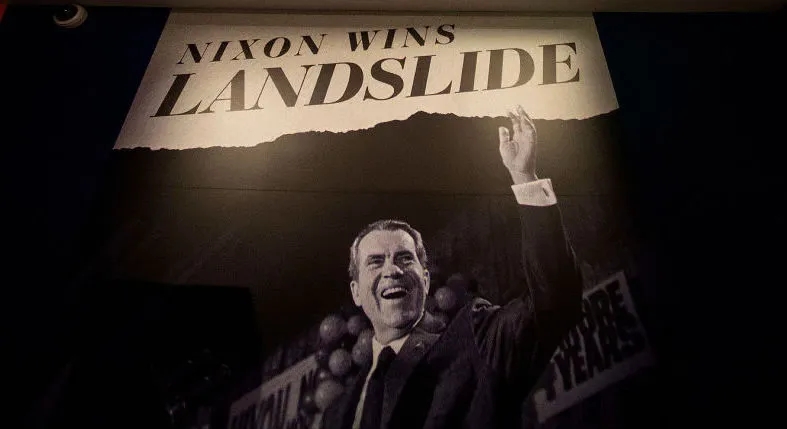
1. "How could Donald Trump have won 51 percent of the popular vote?"
2. "How hard is it to immigrate to New Zealand?"
3. "What the actual fuck?"
Fair questions. Let's try a thought experiment. Could Tuesday's election results have been any worse?
Well, what if, instead of 51 percent, the Republican nominee had won 59 percent? Or 61 percent? And what if he had won 49 states?
Those aren't hypotheticals. Those were the results of the 1972 and 1984 landslides that reelected Richard Nixon and Ronald Reagan.
With thumping victories like those, what could possibly go wrong for the winners?
If history's any guide, some nasty surprises await Donald Trump.
In 1972, the Democratic presidential nominee, George McGovern, won just 37.5 percent of the vote, carrying only Massachusetts and the District of Columbia for a total of 17 Electoral College votes. He didn't even win his home state, South Dakota.
In 1984, Democrat Walter Mondale did carry his native Minnesota, but that was as good as it got for him. In the Electoral College, he fared even worse than McGovern, with a whopping 13 votes.
In the aftermath of these thrashings, the Democratic Party lay in smoldering ruins, and Republicans looked like indestructible conquerors.
Now, some might argue that those GOP victories, though statistically more resounding than Trump's, weren't nearly as alarming, because he's a criminal and wannabe autocrat.
But Trump's heinousness shouldn't make us nostalgic for Nixon and Reagan. They were also criminals—albeit unindicted ones. And they were up to all manner of autocratic shit—until they got caught.
The Watergate scandal was only one small part of the sprawling criminal enterprise that Nixon directed from the Oval Office in order to subvert democracy. For his part, Reagan's contribution to the annals of presidential crime, Iran-Contra, broke myriad laws and violated Constitutional norms.
The hubris engendered by both men's landslides propelled them to reckless behavior in their second terms—behavior that came back to haunt them. Nixon was forced to resign the presidency; Reagan was lucky to escape impeachment.After the Watergate scandal forced Richard Nixon from office, this bumper sticker helped Massachusetts voters brag that they handed him his only Electoral College loss in 1972.
Of course, Trump would be justified in believing that no matter how reckless he becomes, he'll never pay a price. He's already been impeached—twice—only to be acquitted by his Republican toadies in the Senate. And now that the right-wing supermajority of the Supreme Court has adorned him with an immunity idol, he'll likely feel free to commit crimes that Nixon and Reagan could only dream of. Who'll stop him from using his vast power to persecute his voluminous list of enemies?
Well, the enemy most likely to thwart Trump in his second term might be one who isn't on his list: himself. The seeds of Trump's downfall may reside in two promises he made to win this election: the mass deportation of immigrants and the elimination of inflation.
Trump's concept of a plan to deport 20 million immigrants is as destined for success as were two of his other brainchildren, Trump University and Trump Steaks. The US doesn't have anything approaching the law-enforcement capacity to realize this xenophobic fever dream.
And as for Trump's war on inflation, the skyrocketing prices caused by his proposed tariffs will make Americans nostalgic for pandemic-era price-gouging on Charmin.
It's possible that Trump's 24/7 disinformation machine, led by Batman villains Rupert Murdoch, Tucker Carlson, and Elon Musk, will prevent his MAGA followers from ever discovering that 20 million immigrants didn't go anywhere. And it's possible that if inflation spikes, he'll find a scapegoat for that. (Nancy Pelosi? Dr. Fauci? Taylor Swift?)
And, yes, it's possible that Trump will somehow accomplish his goal of becoming America's Kim Jong Un, and our democracy will go belly-up like the Trump Taj Mahal casino in Atlantic City.
But I wouldn't bet on it. I tend to agree with the British politician Enoch Powell (1912-1998), who observed that all political careers end in failure. I doubt that Trump, with his signature blend of inattention, impulsiveness, and incompetence, will avoid that fate.
And when the ketchup hits the fan, the MAGA movement may suddenly appear far more fragmented and fractious than it does this week. You can already see the cracks. Two towering ignoramuses like Marjorie Taylor Greene and Lauren Boebert should be BFFs, but they despise each other—the only policy of theirs I agree with.
If things really go south, expect MAGA Republicans to devour each other as hungrily as the worm who feasted on RFK Jr.'s brain—and that, my friends, will be worth binge-watching. I'm stocking up on popcorn now before Trumpflation makes it unaffordable.
One parting thought. Post-election, the mainstream media's hyperbolic reassessment of Trump—apparently, he's now a political genius in a league with Talleyrand and Metternich—has been nauseating. It's also insanely short-sighted. Again, a look at the not-so-distant past is instructive.
In 1984, after Reagan romped to victory with 59 percent of the popular vote and 525 electoral votes, Reaganism was universally declared an unstoppable juggernaut. But only two years later, in the 1986 midterms, Democrats proved the pundits wrong: they regained control of both the House and Senate for the first time since 1980. Those majorities enabled them to slam the brakes on Ronnie's right-wing agenda, block the Supreme Court nomination of Robert Bork, and investigate Iran-Contra.
The lesson of the 1986 midterms is clear: the game's far from over and there's everything to play for. If we want to stem the tide of autocracy and kleptocracy, restore women's rights and protect the most vulnerable, we don't have the luxury of despair. The work starts now.
